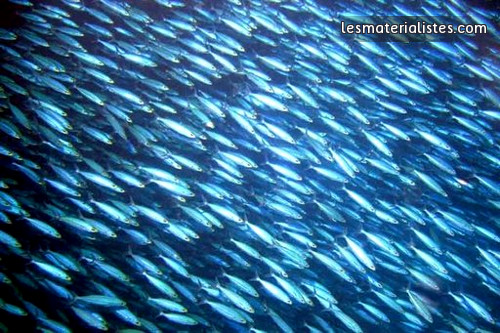Compassion and empathy: living matter at the heart of dialectical materialism
Submitted by Anonyme (non vérifié) Where does the sensation come from ? Such a question is a typical error, the produce of the feudal and the bourgeois approaches, which separate the brain and the body. The feudal conception separates them totally, whereas the bourgeois way links them in a tormented way.
Where does the sensation come from ? Such a question is a typical error, the produce of the feudal and the bourgeois approaches, which separate the brain and the body. The feudal conception separates them totally, whereas the bourgeois way links them in a tormented way.
Both consider that the question of the sensation is connected to the body, to the interpretation of the body by the brain. A feeling, a sensation, can not exist in itself; it has an existence only in the case of an interpretation by an individual.
The reason for this anthropocentrism resides in Metaphysics. For the feudal conception, the mind must leave the body and join the origin of the world, God, which is immaterial. For the bourgeois conception, we can not explain the origin of the world, so we should restrain us in elaborating theory about the relationships we make with reality.
 Life is seen through individuals, through their relationships. There is no world, no nature, only a world, a nature existing insofar we have a relationship to them.
Life is seen through individuals, through their relationships. There is no world, no nature, only a world, a nature existing insofar we have a relationship to them.
This conception was necessary to the bourgeois to justify the existence of the capitalist, which is an individual acting through his own understanding of its surrounding reality. Protestantism is here the main ideological construction of this approach.
Nowadays, existentialism and all the post-modernist variants that exist support a terrorist version of this self-centrednedss, this vision of the world based merely on the individuals.
Therefore, in the history of science dominated by the bourgeoisie, it was always considered that animals know no pain. They are considered as mere mechanisms, by Descartes and Malebranche notably, without a “conscience”.
Of course, this wrong conception proved more and more wrong, through the affirmation of democratic and socialist thought.
 One major historical event here is when, on 10 December 1907, in a turmoil following an dissection of a living brown dog in London, 1,000 medical students marched through central London waving effigies of a brown dog on sticks, justifying and promoting vivisection, attacking for this reason suffragettes and trade unionists fighting against vivisection.
One major historical event here is when, on 10 December 1907, in a turmoil following an dissection of a living brown dog in London, 1,000 medical students marched through central London waving effigies of a brown dog on sticks, justifying and promoting vivisection, attacking for this reason suffragettes and trade unionists fighting against vivisection.
Two conceptions of the world struggled. Nowadays, the sensation of pets are recognized, but they are still mistreated; the sensation of vertebrates is also recognized but they are considered as of minor interest.
Moreover, the sensation of fishes and invertebrates are openly negated, in the name of the nervous system and the brain, in an anthropocentric conception.
On the contrary, dialectical materialism connects living matter to sensation.
In Materialism and Empirio-criticism, Lenin deals with this question among others, and remembers us this important question :
“There still remains to be investigated and reinvestigated how matter, apparently entirely devoid of sensation, is related to matter which, though composed of the same atoms (or electrons), is yet endowed with a well-defined faculty of sensation. Materialism clearly formulates the as yet unsolved problem and thereby stimulates the attempt to solve it, to undertake further experimental investigation.”
 Lenin says also that we have certainly to go in the direction of considering that, in the foundation of the structure of matter, we can surmise the existence of a faculty akin to sensation, like Denis Diderot did it.
Lenin says also that we have certainly to go in the direction of considering that, in the foundation of the structure of matter, we can surmise the existence of a faculty akin to sensation, like Denis Diderot did it.
And indeed, compassion and empathy are a proof of it. What is the dialectical materialist conception of reflect? That the brain reflects reality; what we think is an echo.
But, if René Descartes and Emmanuel Kant are right, if each individual is like surrounded by a Chinese wall, how is it possible to feel what somebody else feels? How are compassion and empathy possible ?
This is only possible because living matter knows sensations; sensations are linked to the principle of echo, of movement of matter.
 That is why a revolution can occur: the masses have synthesized, at different levels, the same vision of the world, corresponding to reality.
That is why a revolution can occur: the masses have synthesized, at different levels, the same vision of the world, corresponding to reality.
Revolution occurs at the general level, compassion and empathy at the individual levels, but their foundation is the fact that matter and sensation can not be separated.
Living matter is therefore at the heart of dialectical materialism, as it is a developed form of matter, a direction which corresponds to the auto-movement of matter itself to more complexity.
This is the reason why we have to recognize, cherish and defend the dignity of reality of nature, of the animals, of each living being, which correspond to the auto-development of matter, and participate in the global system of life on our planet as a Biosphere.
